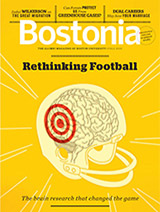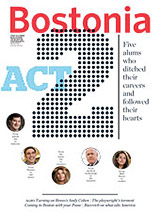Will Lautzenheiser, a former lecturer at COM who lost both of his arms and legs nearly three years ago to a virulent Group A streptococcus infection that evolved to necrotizing fasciitis, has been approved by doctors at the Brigham and Women’s Hospital (BWH) for a bilateral arm transplant, a procedure that has been performed twice at the hospital and only a few times in the United States.
Lautzenheiser, who spent nearly 20 years on the BU campus as a student, staff member, and lecturer, says he is very excited about the prospect of a double arm transplant, but mindful of his doctors’ description of the process as “uneasy.”
“It’s uneasy in every way,” says Lautzenheiser (CAS’96, COM’07). “It’s uneasy to find a donor match and the whole process makes one feel uneasy, because for it to happen, it means that someone who is now alive and using their arms will be dead.”
Lautzenheiser’s approval for the experimental procedure by the hospital’s Institutional Review Board was announced at a press conference on June 26, when his doctors, Simon Talbot, an assistant professor of surgery at Harvard Medical School, and Bohdan Pomahac, director of plastic surgery transplantation at BWH and associate professor of surgery at Harvard Medical School, described the complex process of finding a suitable donor. The matching process considers blood type, antibodies, gender, age, and skin tone, among other things. Lautzenheiser’s approval for the procedure involved extensive physical, psychological, and psychiatric evaluations. The hospital is now working with the New England Organ Bank to find a donor.
Talbot said during the press conference that the surgery would require two surgeons on each limb and would take from 12 to 16 hours. The surgeons will operate at no charge, and the hospital will cover other expenses surrounding the procedure. A major concern in all organ transplants, Pomahac said, is that organ recipients must remain on immunosuppressant drugs for their entire lives, which can weaken a patient’s immune system. Talbot said Lautzenheiser, now 40, would be the hospital’s first recipient of a transplanted arm that includes an elbow, requiring nerves and muscles to make connections of unprecedented complexity.
Lautzenheiser and the medical team are also considering a bilateral leg transplant, to be performed at a later date. Pomahac said performing a double arm transplant and a double leg transplant at the same time was “not safe.” Lautzenheiser currently uses arm and leg prostheses.
Lautzenheiser says it is an honor and a privilege to work with the transplant surgeons. “The whole team is really extraordinary,” he says. “They are among the most amazing people I have ever met.”
Lautzenheiser, who was a lecturer at COM from the fall of 2007 to the spring of 2011, was stricken with a Group A streptococcus infection just days after leaving BU for a teaching job at Montana State University in Bozeman, Mont. He was treated at hospitals in Montana and Utah, where his necrotic arms and legs were amputated to save his life. He later spent four months in therapy at the Boston Medical Center, followed by two months at Spaulding Rehabilitation Hospital.
Lautzenheiser says that while he doesn’t have to worry about the costs of the procedure or his stay at Brigham and Women’s Hospital, he knows that his future holds many challenges. For months after the procedure, for example, his arms will require forced movement and massage by a therapist every hour from 7 a.m. to 11 p.m.
“The recovery process is the thing I have the most anxiety about,” he says. “It’s all those things I am going to put my family and my friends through. That’s an enormous consideration. And there is the potential of being in a lot of pain. This is certainly going to be a tremendous gift in terms of my activity, but I’ve struggled to regain some independence, which I finally have, and I’m going to give that up at least for a while. What keeps me going is the goal of coming back and exceeding where I am now.”
Read more about Will Lautzenheiser in Bostonia magazine.













































Related Stories
Rare Double Arm Transplant for Former COM Lecturer
Will Lautzenheiser is reminded how great a hug can feel
Double Arm Transplant Recipient Will Lautzenheiser Speaks at BU
Stumped, film about an alum by an alum, screens at COM’s Cinemathèque
Former Iranian Captive Jason Rezaian Speaks at COM
Accepts Hugo Shong Reporting on Asia Award in person
Post Your Comment